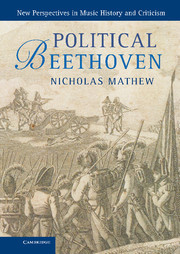Description
Political Beethoven
New Perspectives in Music History and Criticism Series
Author: Mathew Nicholas
Political Beethoven explores Beethoven's music as an active participant in political life from the Napoleonic Wars to the present day.
Language: EnglishApproximative price 107.81 €
In Print (Delivery period: 14 days).
Add to cart
Political Beethoven
Publication date: 12-2012
Support: Print on demand
Publication date: 12-2012
Support: Print on demand
Approximative price 30.28 €
In Print (Delivery period: 14 days).
Add to cart
Political Beethoven
Publication date: 09-2016
Support: Print on demand
Publication date: 09-2016
Support: Print on demand
Description
/li>Contents
/li>Biography
/li>
Musicians, music lovers and music critics have typically considered Beethoven's overtly political music as an aberration; at best, it is merely notorious, at worst, it is denigrated and ignored. In Political Beethoven, Nicholas Mathew returns to the musical and social contexts of the composer's political music throughout his career - from the early marches and anti-French war songs of the 1790s to the grand orchestral and choral works for the Congress of Vienna - to argue that this marginalized functional art has much to teach us about the lofty Beethovenian sounds that came to define serious music in the nineteenth century. Beethoven's much-maligned political compositions, Mathew shows, lead us into the intricate political and aesthetic contexts that shaped all of his oeuvre, thus revealing the stylistic, ideological and psycho-social mechanisms that gave Beethoven's music such a powerful voice - a voice susceptible to repeated political appropriation, even to the present day.
Introduction: political collaborations; 1. Music between myth and history; 2. Beethoven's moments; 3. The sounds of power and the power of sound; 4. The inner public; 5. After the war; Appendix: eighteenth- and early nineteenth-century musical sources consulted.
Nicholas Mathew is a professor in the Department of Music at the University of California, Berkeley. He was educated at his local comprehensive school in Norwich, England, and went on to study music at Oriel College, Oxford and piano at the Guildhall School of Music and Drama. After earning his doctorate from Cornell University, New York, where he also studied period pianos with Malcolm Bilson, he was a Junior Research Fellow at Jesus College, Oxford. He is editor, with W. Dean Sutcliffe, of the journal Eighteenth-Century Music and has published on matters relating to Beethoven, Haydn, Mozart, music aesthetics and musical performance in, among others, Musical Quarterly, Eighteenth-Century Music, Nineteenth-Century Music, Current Musicology and the Journal of the Royal Musical Association. He is a contributor to the volume Engaging Haydn (edited by Richard Will and Mary Hunter, 2012).
© 2024 LAVOISIER S.A.S.
These books may interest you

The Seven Concertos of Beethoven 111.58 €

The Seven Concertos of Beethoven 40.18 €



